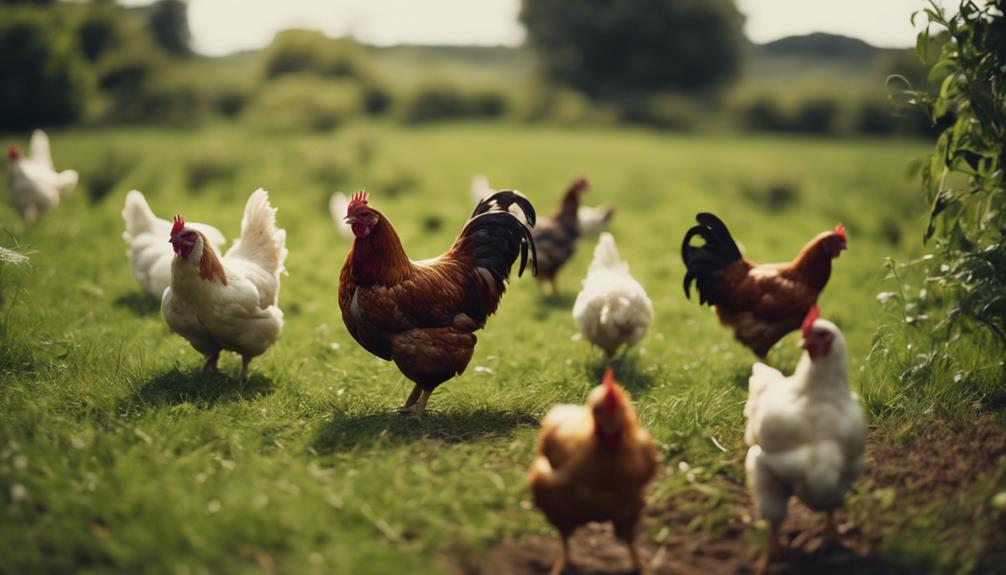Chickens can thrive on foraging. Their instinctual behavior of exploring for insects, seeds, and plants provides essential nutrients like protein, vitamins, and minerals. Foraging offers exercise, mental stimulation, and leads to healthier, tastier eggs. It promotes species-appropriate living, unadulterated meat, and flavorful eggs. Nutrient-rich insects aid muscle development, while seeds supply necessary vitamins. A balanced diet guarantees muscle growth, health, and egg production. Foraging enhances well-being, reduces stress, and produces happier poultry. So, by letting chickens forage, you support their natural instincts, health, and egg quality.
Key Takeaways
- Chickens can survive on foraging as it provides essential nutrients.
- Foraging supports natural behaviors vital for chicken well-being.
- Balanced foraging diet enhances egg-laying performance and product quality.
- Foraging promotes physical exercise and mental stimulation for chickens.
- Supplementing foraging with a balanced diet ensures optimal health and survival.
Natural Foraging Behavior
Exploring their surroundings for insects, seeds, plants, and small creatures comes naturally to chickens, reflecting their instinctual foraging behavior. This behavior is more than just an important for their health.
Foraging provides essential nutrients like protein, vitamins, and minerals that are necessary for chickens to thrive. When chickens are allowed to free-range and forage, they reduce their reliance on commercial feed, leading to a more balanced diet.
Not only does foraging promote exercise and mental stimulation, but it also allows chickens to exhibit their natural behaviors, which is essential for their overall well-being.
In addition to the health benefits for chickens, foraging can also result in healthier eggs. The diverse diet obtained through foraging can lead to eggs that aren't only more nutritious but also tastier.
Benefits of Foraging for Chickens

When chickens engage in foraging, they experience a range of benefits that contribute to their overall well-being and the quality of the products they produce. Here are some advantages of foraging for chickens:
- Species-Appropriate Life: Foraging allows chickens to exhibit their natural behavior and instincts, promoting a healthier and happier existence.
- Unadulterated Meat: Chickens on free-range foraging diets often yield meat that's free from artificial additives and rich in flavor, providing a more wholesome option.
- Flavorful Eggs: Free-range foraging can result in chickens producing eggs with a more intense and delicious taste compared to those solely fed on commercial feed.
Dietary Needs of Chickens

Chickens have specific dietary needs that must be met for best health. Providing a balanced diet rich in essential nutrients is key for their well-being.
Foraging can supplement their diet with valuable proteins and vitamins necessary for muscle growth and egg production. Foraging also encourages natural behaviors, keeping them mentally stimulated and reducing the need for additional feed. It’s important to be mindful of the environment and seasonality when choosing plants and insects for them, as not all options are safe or beneficial. Consider researching wild food foraging tips to ensure you select appropriate, non-toxic sources for your animals that will enhance both their health and vitality. Moreover, introducing a variety of forage options helps diversify their nutrient intake, supporting stronger immune systems and overall well-being. By integrating wild food survival tips into your foraging practices, you can ensure you’re making informed decisions that will benefit both your animals and the local ecosystem. Just be sure to monitor their responses to new foraged items and adjust as needed to maintain balance in their diet.
Essential Nutrients Foraging
A diverse foraging environment plays a vital role in the nutritional well-being of chickens, providing them with essential nutrients such as protein, vitamins, and minerals. When chickens roam and forage, they can discover a variety of nutritious elements that contribute to their health:
- Insects: Rich in protein, insects like worms and beetles are essential for muscle development and overall growth.
- Seeds: Seeds are a good source of vitamins and minerals, offering chickens a well-rounded diet for peak health.
- Plants: Green plants provide vitamins like A and K, aiding in immune function and bone health.
Foraging not only supports the physical health of chickens but also helps them maintain a balanced diet. By engaging in their natural foraging behavior, chickens can ensure they receive the necessary nutrients for their well-being, making it an essential part of their dietary habits.
Balanced Diet Foraging
To guarantee the best health and egg production, chickens require a balanced diet comprising protein, fiber, vitamins, minerals, and calcium. Foraging plays an important role in meeting these dietary needs. When chickens forage, they consume a variety of nutrients essential for their well-being. Insects, seeds, berries, and plant leaves provide a natural source of these essential elements.
Grass, a common foraging item, offers fiber, vitamins, and minerals that complement a chicken's diet perfectly. Foraging in pastured areas allows chickens to obtain up to 60% of their nutritional requirements from insects like grasshoppers and worms. This natural behavior not only supports their health but also leads to healthier products like eggs.
Importance of Balanced Diet

Ensuring a well-rounded diet is essential for the peak health and performance of your feathered friends. When it comes to feeding your chickens, a balanced diet plays an important role in supporting their muscle growth, overall health, and egg production.
Here are three significant reasons why a balanced diet is crucial for your chickens:
- Protein: Chickens need protein for muscle development and egg production. Including protein-rich foods in their diet is necessary for their growth and productivity.
- Vitamins and Minerals: A diet rich in vitamins and minerals helps boost the immune system of chickens, keeping them healthy and resilient to diseases.
- Fiber and Calcium: Fiber aids in digestion, while calcium is essential for strong eggshells. Providing a variety of foods that offer fiber and calcium ensures your chickens stay healthy and lay quality eggs.
Enhancing Chicken Well-being

Enhancing chicken well-being through foraging fosters a natural and enriching environment for your flock. By allowing chickens to engage in their natural behavior and instincts, foraging promotes mental and physical health. This leads to happier and healthier poultry overall. Not only does foraging contribute to their well-being, but it also results in more flavorful and nutritious eggs and meat for you. Let's take a look at how foraging benefits your chickens:
| Aspect | Impact |
|---|---|
| Mental Health | Encourages natural behavior and reduces stress levels |
| Physical Health | Promotes exercise and access to diverse nutrients |
| Flavorful Eggs | Results in richer, tastier eggs due to varied diet |
Incorporating foraging into your chicken care routine is a simple yet effective way to enhance the quality of life for your feathered friends while also reaping the benefits of healthier and more delicious produce.
Sustainable Practices in Animal Care

Sustainable practices in animal care, such as foraging, offer numerous benefits for both the animals and the environment.
By allowing chickens to forage for their food, they can exhibit natural behaviors and consume a diverse diet, leading to healthier and happier birds.
Additionally, this approach reduces the environmental impact of animal farming by promoting ecosystem balance and decreasing reliance on commercial feed.
Foraging Benefits
Implementing foraging practices for chickens not only encourages natural behaviors but also contributes to a more sustainable approach in animal care. By allowing chickens to roam and search for food, you provide them with a range of benefits:
- Varied Diet: Chickens can enjoy a diverse array of foods, leading to healthier and more flavorful meat and eggs.
- Essential Nutrients: Foraging enables chickens to find crucial nutrients like protein, vitamins, and minerals in their natural environment.
- Reduced Reliance: Sustainable foraging practices help reduce the need for supplements and artificial additives, promoting a more natural and balanced diet for your flock.
While foraging offers numerous advantages, it's crucial to be mindful of challenges such as increased predation risk and the availability of suitable forage. By carefully managing these aspects, you can create a balanced foraging environment that benefits both your chickens and the sustainability of your animal care practices.
Environmental Impact
Promoting environmentally conscious practices in animal care involves minimizing the impact on ecosystems while prioritizing the long-term health and well-being of your livestock. When it comes to chickens, foraging can have a positive environmental impact. By allowing chickens to exhibit their natural behaviors like scratching and pecking for food, you not only enhance their well-being but also contribute to sustainable practices in animal care.
Chickens foraging in a rotational grazing system can help maintain soil health by aerating the ground and spreading nutrients through their droppings. This natural fertilization process minimizes the need for chemical inputs and reduces waste buildup.
Implementing such sustainable practices not only benefits the chickens by providing them with a more enriched environment but also has wider environmental implications. By reducing environmental pollution, promoting biodiversity, and fostering a more sustainable food system, sustainable animal care practices play an important role in ensuring a healthier ecosystem for all.
Promoting Optimal Health and Egg Production

To enhance the health and egg production of your chickens, prioritize promoting their natural foraging behavior. Encouraging your chickens to forage not only aligns with their natural instincts but also has significant benefits for their overall well-being and the quality of eggs they produce.
Here are three key ways foraging contributes to peak health and egg production:
- Nutrient-Rich Diet: Foraging allows chickens to consume a diverse range of insects, plants, and seeds, providing essential nutrients that may be lacking in commercial feed alone.
- Physical Exercise: Actively foraging stimulates physical activity, which helps maintain healthy body weight and muscle tone, leading to improved egg-laying performance.
- Mental Stimulation: Foraging engages chickens' natural behavior, preventing boredom and stress, which can positively impact their egg production and overall health.
Frequently Asked Questions
Can Chickens Survive Just Free Ranging?
You can definitely let your chickens free range! They'll thrive on foraging, finding insects, seeds, and plants. This natural behavior boosts their health and cuts down on commercial feed. Just keep an eye out for predators and health concerns.
Is Forage Good for Chickens?
Foraging is beneficial for chickens as it promotes natural behavior, provides unadulterated food, and reduces reliance on commercial feed. However, challenges like predation risk and health issues must be considered for successful management.
What Do Chickens Eat When Foraging?
When foraging, chickens eat insects, seeds, plants, and small reptiles. Foraging provides essential nutrients like protein, fiber, vitamins, and minerals. It encourages natural behavior and can reduce the need for commercial feed, promoting overall health.
Can Chickens Survive on Pasture Alone?
You can bet your feathers that chickens can survive on pasture alone! With a bountiful and diverse pasture, these feathered friends will thrive on foraging, getting all the essential nutrients they need to stay healthy and happy.
Conclusion
To sum up, letting your chickens forage can greatly benefit their health and well-being. By allowing them to exhibit their natural behavior, you're promoting a balanced diet, peak health, and sustainable practices in animal care.
Not only will your chickens be happier and healthier, but you may also see an increase in egg production.
So, let your chickens roam and peck away – it's a win-win for both you and your feathered friends!










